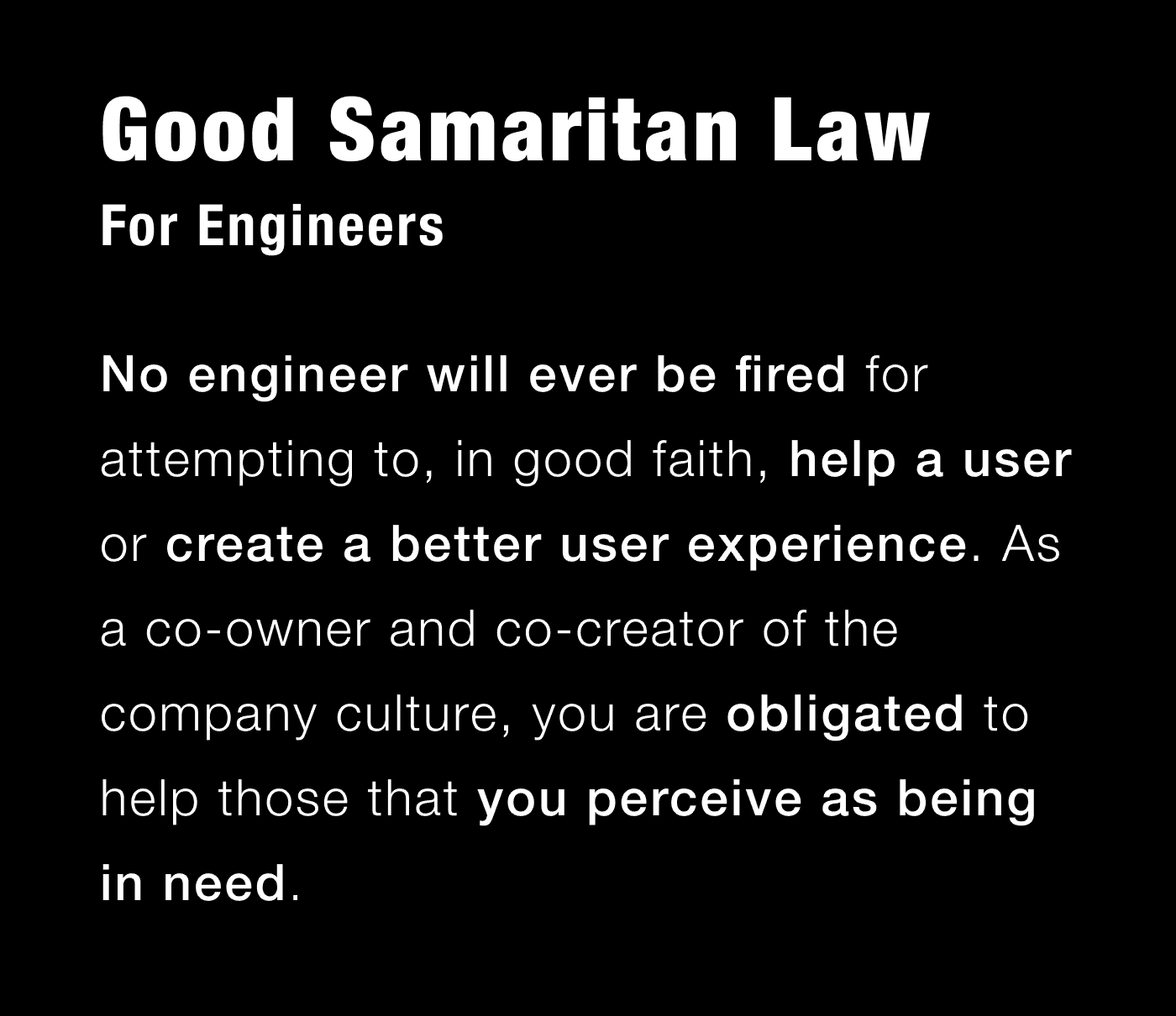A Good Samaritan Law For Engineers At A Software As A Service (SaaS) Company
Time and time again, when I read articles or listen to podcasts about companies that have industry-leading Customer Satisfaction ratings, it almost always turns out that the employees at said companies are granted special and explicit permission to cater to customer needs. A great example of this can be seen in a recent Freakanomics Radio podcast about Trade Joe's. According to the episode, most of the employee training at Trade Joe's deals with customer interactions. And, specifically, with the lengths to which an employee should go in order to make sure that a customer is happy:
.... there was some discussion of process. But actually there was a lot of discussion of Trader Joe's values. There was a tremendous amount of discussion about how are you going to be with the customers.
No matter how crazy the store was, no matter how much pressure there was to do something else, if you were doing something for a customer, that trumped everything. (Freakanomics Radio, Ep. 359)
When you place the customer at the top of your priorities list, then everything you do rolls up to them. And, in the end, you wind up with scenarios like this:
It really didn't matter if it was a little old lady that was looking for one $5 bottle of wine, and if the wine shipment had just come in the back, I would go and look through 100 different cases and see if I could find the one that she wanted, and get her that one bottle of wine. If I spent 15 minutes doing that, and that made that customer really happy, then the managers were happy, and the store was happy. (Freakanomics Radio, Ep. 359)
It's easy to see why people love shopping at Trader Joe's. When your employees are empowered to treat the Customer as King, good things naturally happen.
I was thinking about this yesterday during an Engineering Leadership meeting at work. VPs, Directors, and Leads got together to discuss the Engineering Principles that the department holds; and, how we can create a culture that ensures that these principles are put into practice. After listening to the breakdown of People, Process, and Technology, I brought up the idea of employee empowerment. How can we, as a engineering team, be like Trader Joe's? How can we instill in our people the unwaivering conviction that they have the freedom to create a better user experience?
One idea that popped into my head was to create a Good Samaritan Law For Engineers: an explicit promise by the company that no engineer will ever be fired for attempting to, in good faith, help a user or create a better user experience. And, I don't mean as an implicit piece of the Tribal Knowledge; I mean as an explicit, codified part of the culture - an entry in the employee handbook - a poster, up on the wall, that any employee can look at and point to and use in their decision making algorithm.

To be completely honest, this is the assumption that I already operate under. As an engineer who has been with InVision for 7-years, I have had the time needed to build confidence that my decision making skills are solid. I have developed strategies for balancing the work that I'm asked to do with the work that I believe needs to be done. And, for the most part, I assume that I'll never be fired for trying to do the right thing.
But, the company is young and growing rapidly. Half of the people here have been here for less than a year. They haven't had time to build the kind of mental model that I have. So, the moment the Good Samaritan Law popped into my head, it just felt right. And, in the current period of growth that our engineering team is experiencing, it feels necessary.
When you feel empowered to act, it becomes such a core part of your character that it colors the way in which you do everything. But, empowerment doesn't come naturally. And, even when you want to empower people, people don't know how - or feel comfortable - accepting the responsibility to exert agency. That's why I love the idea of codifying empowerment as a law of the company. If we can build a truly safe space in which the engineers can operate, then I believe that user empathy, and user engagement, will happen naturally.

Reader Comments
Great article Ben! There is a big different between companies saying they are customer first and actually living it everyday.
@Glenn,
Word up. You see this with a lot of the "principles" that a company has. There's what they say; and then, what they actually do internally :(